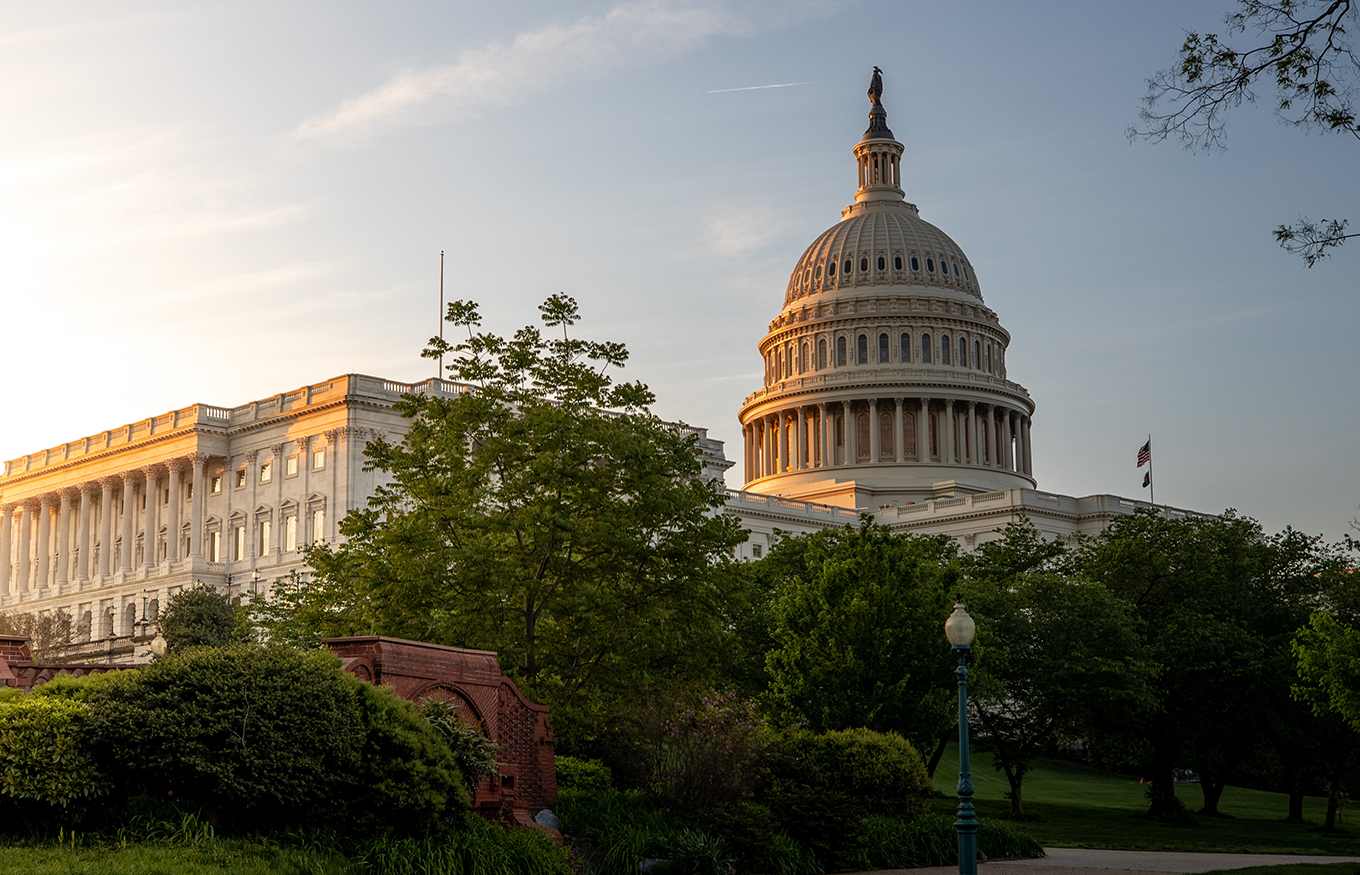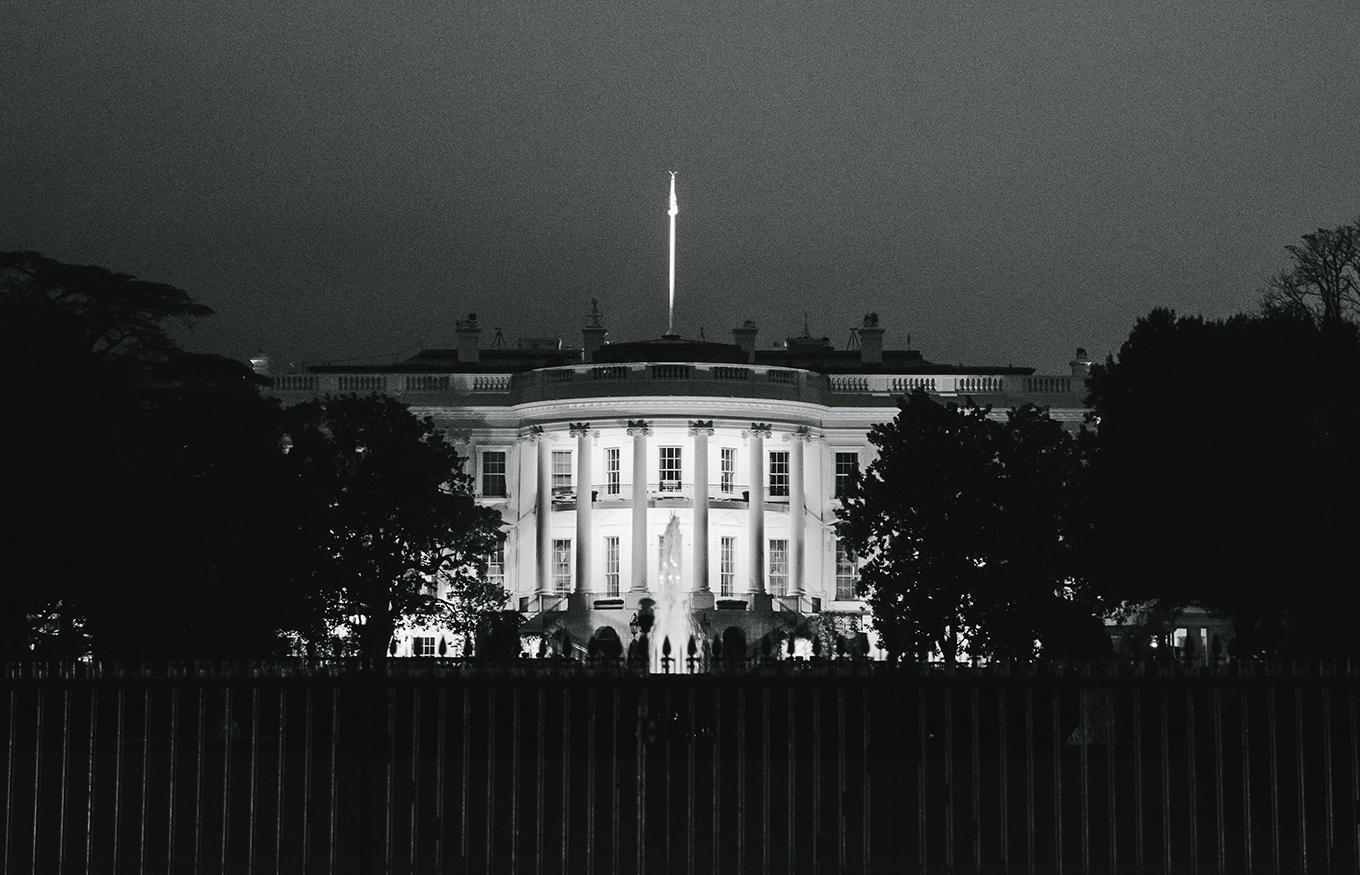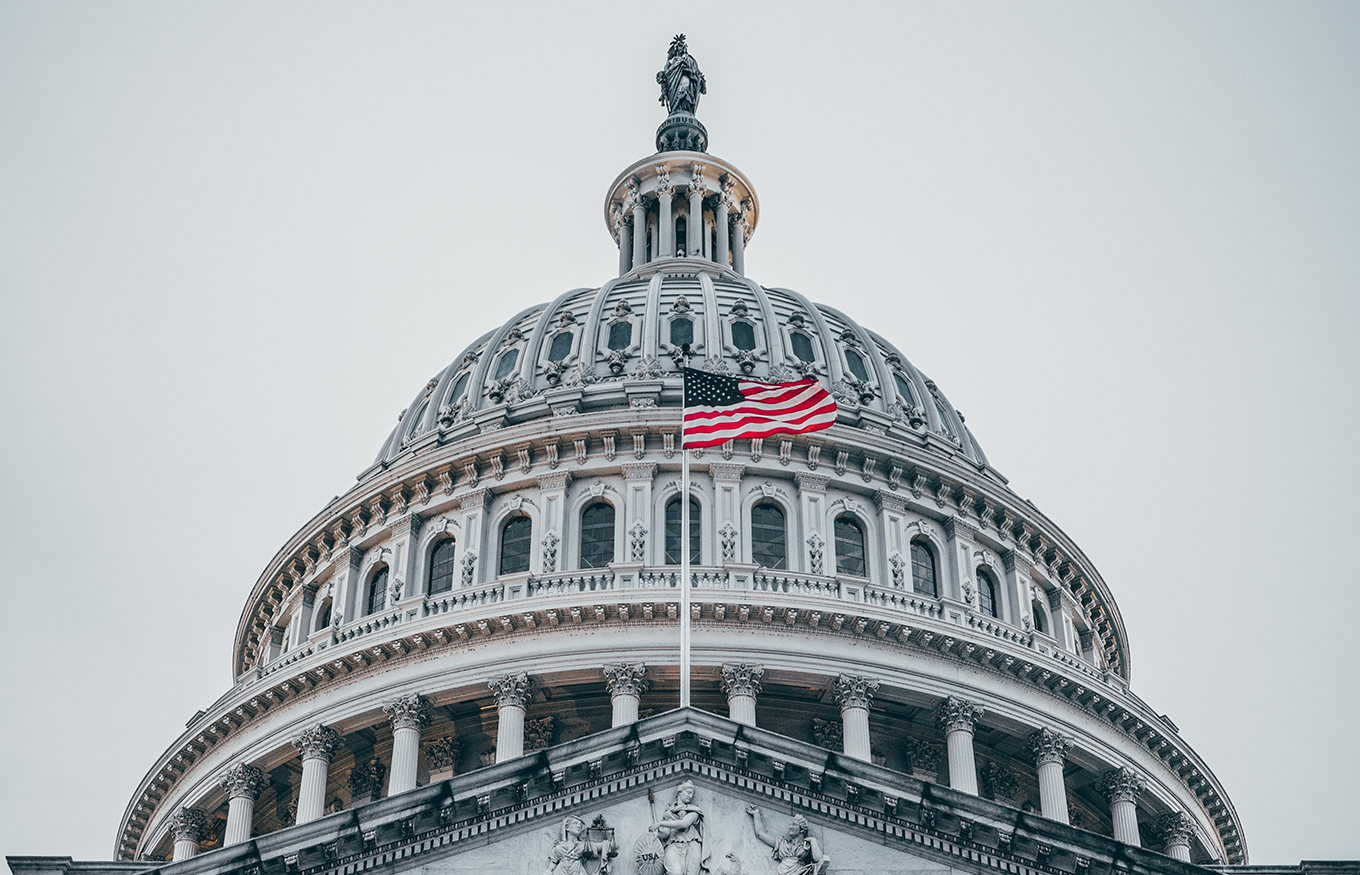Introduction
The Founding Fathers rejected being ruled by a king. That’s why they crafted a system of government with three co-equal branches. At its core lies the separation of powers: Congress makes the laws (Article I), the President executes them (Article II), and the courts interpret them (Article III). When one branch consolidates power at the expense of the others, that balance — and the foundation of American democracy — begins to erode.
The Founders knew that no president should be able to seize for himself or herself powers that defy accountability.
Yet during President Donald Trump’s first 100 days of his second term in the White House, he has broken long-standing norms, moved to consolidate executive branch power, weaponized the federal government against perceived adversaries, and repeatedly pushed guardrails designed to prevent corruption and the appearance of corruption.
We have seen the Trump administration attempt to:
1. Steal the power of the purse from Congress
2. Use federal funding as a tool of ideological control
3. Use emergency declarations as power grabs
4. Dismantle independent watchdogs
5. Monetize the presidency
6. Give government contracts to cronies
7. Defy court orders in immigration cases
8. Undermine sentencing and legal accountability
9. Halt prosecutions of political donors
10. Target legal professionals with state power
These actions reflect not only an erosion of democratic norms, but also a deeper structural concern: The use of executive authority as a personal and political instrument. As power becomes increasingly centralized in the presidency, mechanisms meant to prevent corruption and ensure accountability — from independent watchdogs to judicial checks — are being dismantled or ignored.
This new report from Issue One outlines a series of actions — identified through a review of public records, news articles, and investigative journalism — that reflect a pattern of executive overreach and corruption. Each example demonstrates how the Trump administration is challenging the constitutional principles that have long guided American governance, and have been adhered to by both Republicans and Democrats.
“The Founders were deeply concerned about concentrating too much power in the presidency,” said Issue One CEO Nick Penniman. “The Founders fought a revolution to get rid of concentrated executive authority, and they placed ‘We, the People’ — and Congress — at the center of the Constitution. A hundred days into this administration, it’s clear the White House is intent on pushing the limits of its power to the point where it risks violating the Constitution and eroding the freedoms of every American. This is a time for total vigilance, before the America we were living in 101 days ago begins to disappear.”
Added former Rep. Reid Ribble (R-WI), a member of Issue One’s National Council on Election Integrity and ReFormers Caucus: “Loyalty to the Constitution must come before loyalty to any president. If Congress surrenders its authorities to an executive branch that is attempting to consolidate power and upend our constitutional order, we will cease to be a government of laws. Now is the time for every elected leader to choose principle over partisanship.”
Added former Rep. Claudine Schneider (R-RI), another member of Issue One’s ReFormers Caucus: “This is a dangerous and pivotal time in our country. When the executive branch becomes untethered from constitutional guardrails, Congress has a critical duty to restore balance. If we shrink from that responsibility, the freedom of every citizen is threatened. This is not about the left or right, Democrat or Republican; it’s about the preservation of our republic.”
Added retired Adm. Bill Owens, a member of the National Council on Election Integrity and former vice chairman of the Joint Chiefs of Staff: “Our strength on the world stage has always come from our values at home. Unchecked power isn’t just a threat to our constitutional order, it threatens our entire national security, invites abuse, undermines our global credibility, and weakens the very foundations that make America strong. It’s vital that our elected leaders, particularly those elected by the people to serve in Congress, vigorously defend American values and reinforce our system of checks and balances.”
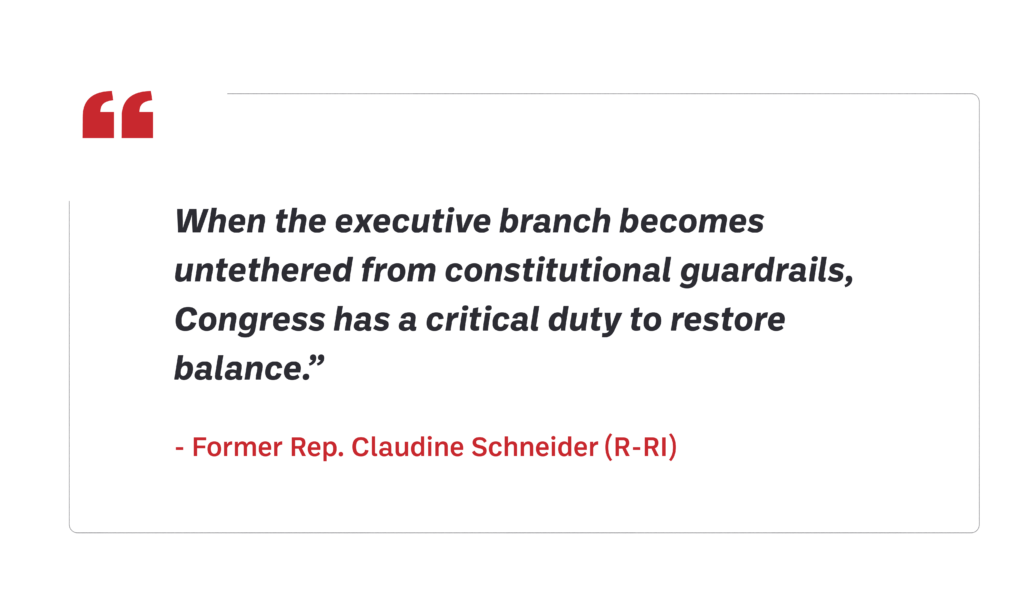
Undermining Article I: Executive Power at the Expense of Congressional Authority
Article I of the U.S. Constitution grants Congress the exclusive authority to legislate, appropriate funds, regulate commerce, and oversee the execution of federal law. These powers are foundational to the separation of powers and are critical to maintaining democratic accountability. Yet during the first 100 days of Trump’s second term, a pattern of executive actions has emerged that openly disregards constitutional boundaries.
Trump has also monetized the presidency in ways that defy both the intent and the letter of Article I, transforming public office into a vehicle for private gain through business enterprises, including new cryptocurrency ventures. Founding Fathers who abhorred the idea of foreign powers corrupting American political leaders would be shocked as today anyone seeking to influence the White House, including foreign interests like Russian oligarchs, members of the Saudi royal family, and members of the Chinese Communist Party, can buy substantial amounts of Trump’s cryptocurrency products to curry favor, while literally lining Trump’s pockets.
The following examples reflect a sustained effort to hollow out Article I authority, concentrate power within the executive branch, and obstruct Congress’s constitutional role as a check on the presidency.
1. Stealing the Power of the Purse
Usurping budgetary decisions undermines congressional spending authority.
From the first day of his second term in office, Trump has been working to bypass Congress and systematically dismantle federal agencies and programs by usurping the power of the purse.
In the wake of the 2024 presidential election, Trump tapped Elon Musk — an unelected tech baron and the richest man on earth — to lead the work of the so-called Department of Government Efficiency (DOGE). And while we can all agree that government efficiency should be improved, taking a chainsaw to our government in such a hamfisted way should alarm everyone who believes that reducing wasteful spending is a noble pursuit.
Article I gives Congress, not the president, the power to appropriate federal funding, and our system was designed such that while the president can propose eliminating funding, only Congress can actually cut it.
Relatedly, only Congress has the power to dismantle congressionally approved agencies. But that hasn’t stopped the Trump administration from pushing agency after agency to the brink, including the Department of Education, the National Weather Service, and the Department of Veteran Affairs.
How has the Trump administration sought to usurp this power from Congress? In January, Trump’s Office of Management and Budget issued a memo that required a “temporary pause” on the disbursement of trillions of dollars in federal grants already allocated by Congress, leading to widespread confusion and concern.
The Trump administration has also threatened to withhold disaster relief funds already approved by Congress, and despite the national security implications, it has suspended nearly all foreign aid programs, including decimating the U.S. Agency for International Development (USAID).
Moreover, the Trump administration has reportedly developed plans to “impound” federal spending they disapprove of. That’s in contravention of the Impoundment Control Act, which was passed in the wake of President Richard Nixon’s controversial use of impoundment in the 1970s when he canceled billions of dollars in federal spending.
Under the Impoundment Control Act, presidents can only use impoundment by submitting requests to Congress about funds they don’t want to disburse, and lawmakers must then approve those requests within 45 days. If Congress doesn’t approve of the impoundment request, funds are released.
2. Federal Funding as a Tool of Ideological Control
Overrides congressional intent for appropriations and may coerce institutions in ways Congress did not authorize.
By threatening organizations’ funding and tax-exempt statuses, the Trump administration has used federal resources to coerce ideological compliance from educational institutions and civil society groups.
Targeted educational institutions include Columbia University, Harvard University, and Northwestern University, among others.
In March, Columbia University agreed to a series of changes in order to restore $400 million in federal funding, including shifting oversight over its Middle Eastern, South Asian, and African Studies departments, adding restrictions over student demonstrations, and increasing campus police.
Meanwhile, even after Harvard University severed ties with a prominent Palestinian university and shook up the board of its Center for Middle Eastern Studies, the Trump administration continues to make new demands — and has threatened to revoke its tax-exempt status.
Trump has also threatened to revoke the tax-exempt status of environmental nonprofits and government watchdogs, including Citizens for Ethics and Responsibility in Washington (CREW), the nonpartisan ethics watchdog that filed the Colorado lawsuit that sought to keep Trump off the 2024 ballot after his role in the January 6th insurrection.
3. Emergency Declarations as Power Grabs
Emergency powers bypass Congress’ authority over spending, trade, and legislative decisions.
Axios recently reported that during the first 100 days of Trump’s second term in the White House, he has “declared more national emergencies — more creatively and more aggressively — than any president in modern American history.”
By creatively exploiting loopholes and declaring fabricated national emergencies, Trump has weaponized presidential authority to bypass the Article I authority granted to Congress. This is especially evident in his efforts to unilaterally implement energy, border, and tariff initiatives that benefit political allies and favored industries.
Trump has so far invoked national emergencies to, among other things, militarize federal lands at the southern border, accelerate energy and mineral production, and to impose the largest tariffs in a century.
Yet lawmakers in both parties have started pushing back on these examples of executive branch overreach — especially around tariffs.
To wit: In early April, four Republican senators — Sens. Susan Collins (R-ME), Mitch McConnell (R-KY), Lisa Murkowski (R-AK), and Rand Paul (R-KY) — joined with Senate Democrats to end the emergency declaration Trump had used to justify tariffs on Canadian imports. Around the same time, bipartisan groups of lawmakers in both the House and Senate introduced legislation that would restore Congress’ constitutional role in trade. Trump has threatened to veto such legislation, ignoring the role of Congress.
Bipartisan Pushback Against Trump’s Overreach on Tariffs
Sen. Chuck Grassley (R-IA), the lead Republican sponsor of the Senate measure to restore Congress’ role in trade, has said the legislation is necessary to “reassert Congress’ constitutional role” and “ensure Congress has a voice in trade policy.”
That sentiment is echoed by Rep. Don Bacon (R-NE), one of the lead sponsors of the House bill, who has said this legislation is needed to ensure a “commitment to uphold the Constitution,” as “Congress has the power of the purse.”
Added Rep. Gregory Meeks (D-NY), another sponsor of the House bill: “For too long, presidents have wielded tariffs as political weapons rather than strategic tools… If a president wants to raise taxes on the American people through tariffs, they should be required to explain why — and get congressional approval to do it.”
Similarly, Sen. Rand Paul (R-KY) has been another outspoken opponent of Trump’s bypassing of Congress on tariffs, saying, “Tariffs are taxes, and the power to tax belongs to Congress — not the president. Our founders were clear: Tax policy should never rest in the hands of one person. Abusing emergency powers to impose blanket tariffs not only drives up costs for American families but also tramples on the Constitution. It’s time Congress reasserts its authority and restores the balance of power.”
4. Dismantling Independent Watchdogs
Undermines Congress’ creation of inspectors general as part of its oversight and administrative enforcement role.
During the first 100 days of his second term in the White House, Trump has routinely attempted to consolidate executive branch power, weaken checks and balances, and exert power over independent federal agencies, including the Consumer Financial Protection Bureau (CFPB), Federal Communications Commission (FCC), Federal Election Commission (FEC), Federal Reserve, Federal Trade Commission (FTC), and Securities and Exchange Commission (SEC).
While campaigning for the presidency, Trump threatened to fire Gary Gensler, the chair of the SEC and an avowed critic of the cryptocurrency industry, “on day one.” Since taking office, Trump forced Gensler out, and Trump has fired the head of the CFPB, fired one of the Democratic commissioners on the six-member FEC, fired the two Democratic commissioners on the five-member FTC, and threatened to fire Jerome Powell, the chair of the Federal Reserve. Many of these agencies have been investigating corporate malfeasance against some of Trump’s largest financial backers, including Big Tech companies, and considering new rules that would substantially affect their business models by taking more steps, for instance, to protect users’ data privacy and the online safety of children.
Additionally, just days after being sworn in in January, Trump fired the inspectors general at 17 different federal agencies, including the Department of Defense, Department of Energy, and Department of State. This means all of these agencies no longer have independent watchdogs ensuring that taxpayer dollars are not being misused or mismanaged. Notably, Trump failed to give Congress the 30-day notice and rationale for dismissal that is legally required for the removal of inspectors general.
All the while, Trump has also urged the head of the FCC to punish CBS News’ 60 Minutes program over coverage he doesn’t like of his administration’s handling of issues related to Greenland and Ukraine.
Bipartisan Pushback Against Trump’s Purge of Inspectors General
Sen. Amy Klobuchar (D-MN) has called it “alarming” that Trump was “removing critical checks on his power.”
Meanwhile, Sen. Susan Collins (R-ME) has said, “I don’t understand why one would fire individuals whose mission it is to root out waste, fraud and abuse.”
5. Monetizing the Presidency
Personal profiteering violates procurement processes, ethics statutes, and oversight authority held by Congress over federal spending.
While Trump and his family have long profited from a sprawling business empire that includes golf courses, hotels, and other ventures, during his second term in the White House, Trump and his family have additionally launched cryptocurrency ventures that enables Trump to intertwine executive policymaking with personal and political enrichment.
For the first time in history, both the president and the first lady are poised to profit from financial transactions involving cryptocurrencies linked to their brands — products that can be purchased by anyone seeking to influence the White House, be that American business leaders or foreign interests like Russian oligarchs, members of the Saudi royal family, and members of the Chinese Communist Party. Now, foreign and domestic special interests can literally buy substantial amounts of these cryptocurrency products to line Trump’s pockets and ingratiate themselves with him, raising huge ethical — and national security — concerns. Making matters even worse is that cryptocurrency transactions are notoriously opaque, meaning there’s virtually no transparency about who is trying to curry favor with the president through these financial transactions.
Cryptocurrency products known as meme coins allow fans to show their support, and they are often used by speculators to make money in extremely volatile markets. Trump’s meme coin, which is known as $TRUMP, was launched at a price of roughly $6.50 ahead of Inauguration Day, rose to a price of $73, and has since fallen to about $14 as of late April. Records show more than 640,000 investors have the product, with only about 2,6000 wallets holding more than $10,000 worth of $TRUMP. (The Melania Trump-branded meme coin is known as $MELANIA, is currently selling for about 40-50 cents, and is held by roughly 240,000 investors.) Trump recently announced plans to meet with approximately 200 people who are the largest investors in his meme coin. As of late April, nine people hold more than $100 million worth of Trump’s meme coin — with one holding more than $250 million.
Trump — who has vowed to make the United States the “crypto capital of the world” — and his family also stand to profit from a crypto venture known as World Liberty Financial, crypto products known as NFT collections and stablecoins, and a Bitcoin mining firm in which the president’s sons Eric Trump and Donald Trump Jr. have large stakes.
He’s also faced accusations of manipulating the stock market itself, after posting on social media that it was “a great time to buy” just hours before pausing his proposed tariffs.
6. Contracts for Cronies
Diverting federal contracts to political donors, weakens Congress’ control over public funds.
During the first 100 days of Trump’s second term in the White House, another concerning trend has been major Trump donors winning large government contracts.
During the 2024 election, Trump’s No. 1 financial backer was Musk, the billionaire whose business empire includes electric car manufacturer Tesla, rocket producer SpaceX, and artificial intelligence startup xAI. According to the nonpartisan money-in-politics tracking organization OpenSecrets, Musk invested more than $290 million into Republican candidates and groups ahead of the 2024 election, nearly all of which supported Trump’s presidential bid.
Amid all the slashing of government services and programs by the Musk-led DOGE, there have been no known cuts to any of Musk’s existing government contracts. Instead, Musk has also seen additional government contracts steered his way.
Multiple federal agencies have either granted or are considering contracts for Starlink, the satellite internet system engineered by Musk’s company SpaceX — sometimes without appearing to go through the usual competitive bidding process for government contracts.
These include a possible $42 billion contract from the Commerce Department for high-speed internet in underserved areas and a possible takeover of a $2.4 billion contract from the Federal Aviation Administration (FAA), which is currently held by Verizon. Meanwhile, the Government Services Administration (GSA), has reportedly already installed Starlink services, and Customs and Border Protection (CBP) has authorized an evaluation of Starlink to help monitor the U.S. border. And SpaceX itself has been working to secure a lucrative Defense Department contract to build a new missile defense system for the United States that Trump has dubbed “Golden Dome.”
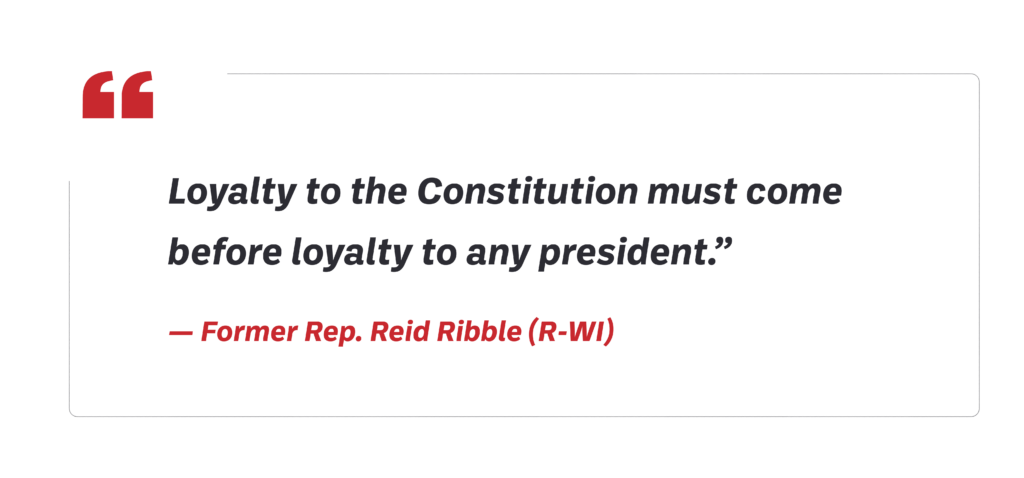
In early March, in a move of solidarity with Musk’s business interests, Trump even transformed the White House lawn into a Tesla showroom. As Trump hosted a news conference, he and Musk were seen alongside a fleet of Tesla vehicles, fielding questions about current events and testing out multiple different Tesla cars. Trump revealed that he’d made two recent Tesla purchases — a Tesla for himself and a Cybertruck for his granddaughter.
Other major Trump supporters have also reaped new rewards.
For instance, Immigration and Customs Enforcement (ICE) awarded the private prison company GEO Group a 15-year, $1.2 billion contract to reopen an immigrant detention facility in Newark, New Jersey. The contract came after the GEO Group and its subsidiaries helped support Trump’s election and inauguration. Ahead of the 2024 election, a subsidiary of the GEO Group donated a combined $1.25 million to two super PACs that backed Trump’s reelection, and after Trump won the 2024 presidential election, records show the GEO Group contributed $500,000 to Trump’s inaugural committee.
And the Trump administration is also seeking to fast-track a permit for a controversial fossil fuel pipeline in Michigan, known as Line 5, which would benefit the company of Tim Barnard, a major Republican donor who, along with his wife, gave a combined $1 million to Trump’s 2024 election efforts.
All the while, Trump continues to help raise big money for the super PAC known as Make America Great Again Inc., which spent $377 million aiding Trump’s 2024 presidential bid, presenting regular opportunities for deep-pocketed special interests to buy access and curry favor with the president.
While presidents of both parties have long showered elite donors with special perks and access, Trump is taking this practice to new heights — while erasing the illusion of supposed independence between big-money outside groups and politicians, a foundational assumption of the Supreme Court’s majority in Citizens United v. FEC, which ushered in the super PAC and dark money era.
Since Trump was elected in November, he’s held at least five separate “candlelight” fundraising dinners for the Make America Great Again Inc. super PAC — each at Trump properties. One of these was held before he was sworn into office, and four have been since Inauguration Day, including one just last week.
Dinner guests are being asked to pay $1 million apiece to secure a spot. Donors who give $5 million can secure a one-on-one meeting with Trump, meetings that have been described as a “hot ticket” in the business world.
Eroding Article III: Disregard for Judicial Independence and the Rule of Law
Article III of the U.S. Constitution establishes the judiciary as a co-equal branch of government, responsible for interpreting the law, ensuring due process, and serving as a check on executive authority.
Yet throughout the first 100 days of Trump’s second term, the administration has repeatedly undermined these judicial powers — politicizing enforcement decisions, disregarding court orders, and using the pardon power to override judicial outcomes. Some of Trump’s congressional allies have even called for judicial impeachments.
These actions reflect not just an indifference to the role of the courts, but a concerted effort to reduce judiciary independence.
The following examples reveal a systematic weakening of Article III institutions and a concerted effort to render them irrelevant. If left unchecked, such behavior threatens the very foundation of rule of law in the United States.
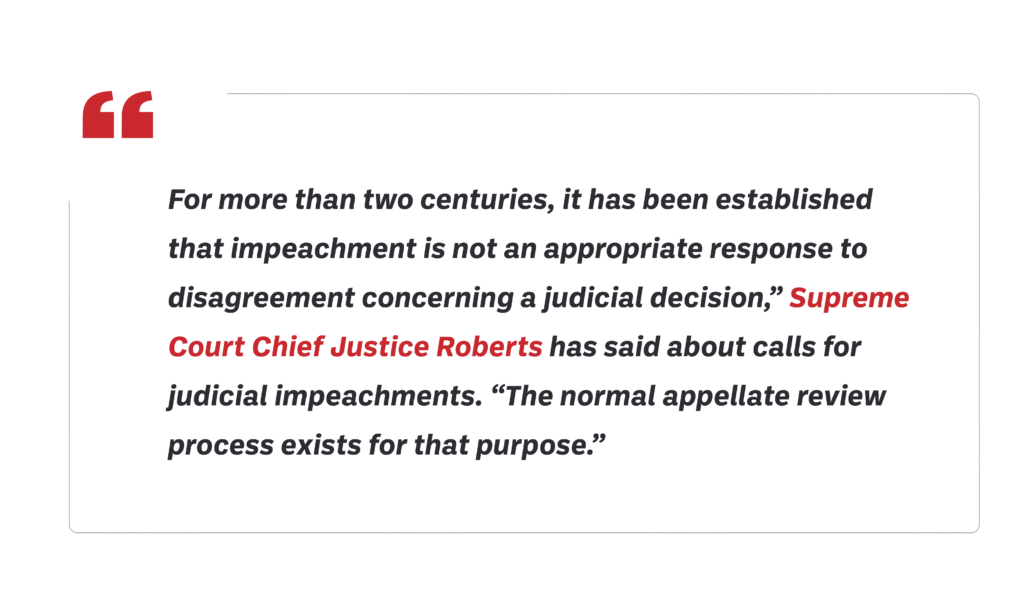
7. Executive Defiance of Court Orders in Immigration Cases
Direct violation of judicial rulings challenges separation of powers and the authority of the judiciary.
Among the administration’s most blatant attacks on the checks and balances of our judicial system is its hostility to judicial review of legal challenges against its mass deportation campaign, in which hundreds of migrants have been sent abroad without due process. These mass deportations and visa revocations have proceeded in defiance of judicial orders, undermining Article III written in our Constitution and centralizing immigration enforcement power within the executive branch.
The Trump administration has justified the deportations as an effort to remove violent criminals by citing activities from Venezuelan prison gang Tren de Aragua and invoking the Alien Enemies Act of 1798, a law that has rarely been used in U.S. history.
Even though U.S. District Judge James Boasberg immediately issued an order blocking the deportations, the Trump administration continued its efforts, led by “border czar” Tom Homan and Acting Director of ICE Todd Lyons — sending migrants to prisons in countries like El Salvador and Rwanda.
Among the most prominent deportees is Kilmar Abrego Garcia, a native of El Salvador, who, despite having no criminal record, was detained by ICE officials and sent to a notorious maximum-security prison in El Salvador. A district court then ordered Abrego Garcia be brought back to the United States, a decision that was backed by the U.S. Supreme Court. Yet, even after admitting his deportation was an “administrative error,” both Trump and Nayib Bukele, the president of El Salvador, have refused to return him.
The Trump administration’s continued neglect of court orders has prompted Boasberg to threaten to hold officials in contempt. Similarly, conservative Judge J. Harvie Wilkinson of the 4th Circuit Court of Appeals, who was considered for a Supreme Court vacancy by former President George W. Bush, has blasted the lack of due process in the government’s treatment of deportees.
In his opinion, which the Supreme Court affirmed on April 19 in a 7-2 ruling, Wilkinson wrote that the Trump administration is “asserting a right to stash away residents of this country in foreign prisons without the semblance of due process that is the foundation of our constitutional order,” continuing to warn that “if today the Executive claims the right to deport without due process and in disregard of court orders, what assurance will there be tomorrow that it will not deport American citizens and then disclaim responsibility to bring them home?”
All the while, Trump’s State Department has moved to revoke more than 1,800 student visas as part of a broader crackdown on immigration and student protests — though most of these visas were restored in late April after legal challenges. The speed and scale of these visa revocations have been unprecedented, and they have raised alarms about chilling free speech. For many of the cancellations, the Trump administration has regularly alleged students support Hamas or other terrorist organizations, with Secretary of State Marco Rubio labeling these students as “lunatics.”
Some of these revocations have escalated to arrests, including Mahmoud Khalil and Mohsen Mahdawi from Columbia University, Badar Khan Suri from Georgetown University, and Rumeysa Öztürk from Tufts University, and some targeted students have been green card holders, which grants them permanent residence status.
8. Undermining Sentencing and Legal Accountability
While pardon power is constitutional under Article II, broad use to shield allies undermines rule of law and judicial outcomes.
Trump has issued sweeping pardons to political allies, January 6 rioters, and even corporations — undermining judicial authority and reinforcing a loyalty-based system of impunity. The most striking example of this was his first pardon, in which Trump pardoned and commuted sentences to more than 1,500 individuals — including members of the extremist militia groups known as the Proud Boys and Oath Keepers — who were involved in the January 6 attack on the Capitol when rioters ransacked the Capitol building and brutally assaulted law enforcement officers.
Craig Sicknick, whose brother was Brian Sicknick, a Capitol Police officer who died the day after being attacked by rioters, has said that Trump’s pardons of Jan. 6 rioters are a “betrayal of decency.”
Trump has also floated the possibility of financial compensation for people who were prosecuted for taking part in the attack.
Trump has thus far issued more than three dozen additional pardons — including to controversial figures such as:
- Silk Road founder Ross Ulbricht, who operated a dark web marketplace that facilitated more than $200 million worth of sales of illegal drugs and other unlawful goods and services;
- Disgraced former Democratic Gov. Rod Blagojevich of Illinois, who was convicted of corruption-related crimes, including trying to sell the U.S. Senate seat vacated by Barack Obama after Obama won the presidency in 2008;
- Former Republican Tennessee state senator Brian Kelsey of Tennessee, who was two weeks into a 21-month sentence for his role in a campaign finance fraud scheme.
Trump has also made history by apparently becoming the first U.S. president to pardon a corporation. Last month, Trump pardoned HDR Global Trading, the company that operates the BitMEX cryptocurrency exchange, which had been sentenced to a $100 million fine for violating anti-money laundering laws. The same day, Trump also issued pardons for three of the company’s co-founders as well as one of its employees.
Notably, one of the people advising Trump on whom to pardon is attorney Gary Lawkowski. Lawkowski was the deputy general counsel for Trump’s 2024 campaign and served as the secretary for both Trump’s transition and inauguration. This means he’s one of the few people who knows which donors gave money to both Trump’s inauguration (which has disclosed its donors) and Trump’s transition (which has not disclosed its donors).
9. Halting Prosecutions for Political Donors
Interference in judicial and enforcement proceedings undermines prosecutorial integrity and judicial independence.
During the first 100 days of Trump’s second term in the White House, a troubling trend has emerged, with law enforcement agencies dropping cases against major Trump donors, including several major donors to Trump’s inauguration as well as the most prominent buyer of the cryptocurrency associated with Trump’s World Liberty Financial venture.
Since Trump won the 2024 presidential election, Chinese crypto entrepreneur Justin Sun — whom the SEC accused, in March 2023, of fraudulently manipulating a cryptocurrency market — has purchased $75 million of crypto tokens from Trump’s World Liberty Financial. These purchases have reportedly earned the president more than $50 million.
Fast forward to February 2025. That’s when the SEC abruptly hit pause on their civil fraud case against Sun. And here’s not the only Trump backer to see enforcement actions halted or dropped altogether.
In an attempt to cozy up to the new administration, four major crypto companies together gave more than $9 million to Trump’s inauguration committee. Coinbase and Kraken each donated $1 million; Robinhood and Ripple Labs gave $2 million and $5 million, respectively.
One apparent result of these contributions? The SEC has stopped investigations against all four companies. Cases involving allegations of operating as an unregistered securities exchange and not registering various crypto assets as securities have been halted.
The financial stakes are enormous: In the unconditional dropping of the SEC’s case against Ripple Labs, for example, the SEC is returning $75 million of a $125 million fine paid by Ripple Labs that stemmed from a 2023 federal court decision.
These cases may just be the tip of the iceberg. Earlier this month, nonpartisan public interest advocacy organization Public Citizen identified 58 corporate donors to Trump’s inauguration that are facing federal investigations or enforcement lawsuits — companies that collectively gave $50 million to Trump’s inauguration. Public Citizen found that cases against 11 of these corporations have already been dismissed or withdrawn, and six have been halted, as of late April 2025.
The Trump administration’s politicization of prosecutions has also extended to dropping major corruption charges against New York City Mayor Eric Adams, after he pledged, on Fox News, to collaborate with the Trump administration on its immigration agenda.
Adams had been indicted in September 2024 on charges related to bribery, wire fraud, conspiracy, and soliciting campaign contributions from foreign nationals in exchange for political favors. He allegedly accepted more than $100,000 worth of luxury hotel stays, lavish meals, and airline upgrades from Turkish nationals beginning in 2016, and prosecutors accused Adams of pressuring fire department officials in New York to allow a Turkish consulate building to open in 2021, despite legitimate safety concerns.
In the months leading up to the dismissal, Adams met and called Trump on multiple occasions, while emphasizing his willingness to cooperate with the administration’s immigration crackdown.
He said he would grant ICE access to the city’s Rikers Island jail, which houses thousands of people, most of whom are either alleged offenders awaiting trial or serving sentences of one year or less.
Attempting to resist political pressure from the Trump administration, several Justice Department prosecutors resigned rather than withdraw the indictment against Adams. Nevertheless, Trump’s Justice Department ultimately withdrew the case, leading to a scathing opinion from the judge who had been overseeing it, who wrote: “Everything here smacks of a bargain: Dismissal of the indictment in exchange for immigration policy concessions.”
10. Targeting Legal Professionals with State Power
Intimidating law firms undermines access to legal representation and impairs judicial independence.
Through targeted executive orders and contract threats, the Trump administration has used its authority to intimidate at least 14 law firms that represented political opponents or participated in investigations of Trump so far, including:
- Perkins Coie, which represented Democrat Hillary Clinton’s 2016 presidential campaign and various Democrats in voting rights challenges during the 2020 election
- Covington & Burling, which provided legal services to special counsel Jack Smith, who investigated Trump’s role in the January 6 attack on the Capitol and Trump’s mishandling of government records, and
- Paul, Weiss, Rifkind, Garrison & Wharton, where an attorney oversaw an investigation of Trump’s finances.
Targeted law firms have shown a mix of responses to Trump’s threats. A few have fought back in court. Far more have struck deals with the Trump administration and have pledged to provide nearly $1 billion worth of pro bono legal services to causes favored by the administration — a disturbing precedent in which legal independence is traded for political survival.
Restoring Balance and Confronting Executive Overreach
While the executive branch has significant power, it is not above the law. The Constitution provides mechanisms and responsibilities to Congress, the courts, and the public to check executive overreach.
The legislative branch holds the power of the purse, the authority to make laws, and the responsibility to oversee the conduct of the executive. Members of Congress swore an oath to the Constitution. That oath carries with it the duty to act when the balance of power is threatened.
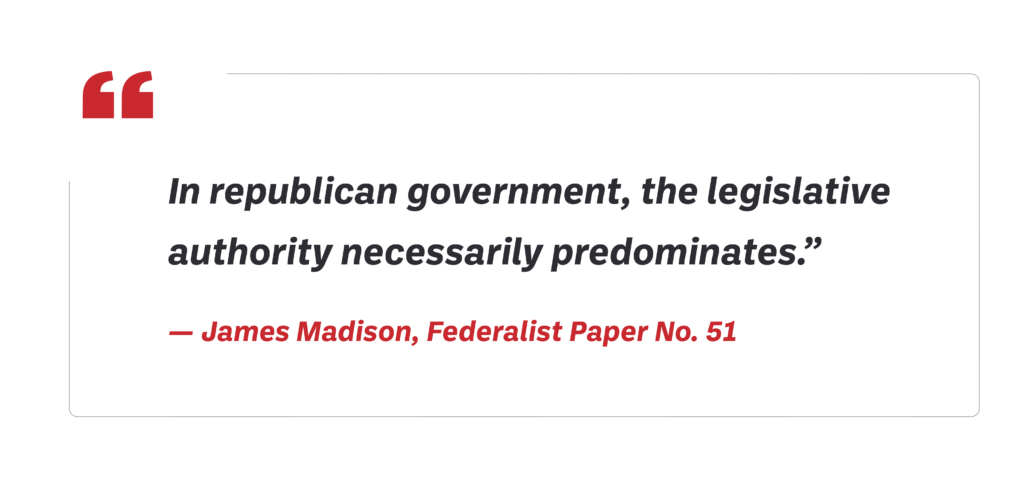
Indeed, the Founding Fathers stressed a fundamental characteristic of republicanism, namely that the legislative branch of government inherently holds more power and influence than the other branches of government. This is because the legislative branch is considered the most direct representative of the people and is responsible for creating laws that govern society.
Yet in the face of repeated and brazen overreach, Congress has too often hesitated or remained divided. Congress must reclaim its Article I authority with the seriousness this moment demands. This means conducting rigorous oversight, defending institutional independence, and challenging abuses not just rhetorically but structurally.
Defending the separation of powers is not a Democratic or Republican duty; it is a constitutional one.
But Congress does not act in a vacuum. The strength of our institutions depends on the vigilance of the people. Voters have a vital role in defending the Constitution — not only by casting ballots but by demanding accountability from those they elect. In moments of democratic backsliding, history has shown that public pressure and civic engagement can be decisive forces.
Voters must insist that their representatives fulfill their constitutional responsibilities. They must support candidates who commit to oversight, transparency, and the rule of law — and reject those who normalize authoritarian practices for short-term gain. The American people have the power to shape the future of the republic, but only if they wield it.
Correction, July 8, 2025: This report initially misstated the number of big-money super PAC fundraisers that President Donald Trump has attended since he was reelected in November. One fundraiser initially counted was not for a pro-Trump super PAC but rather his inaugural committee. Issue One regrets the error.
